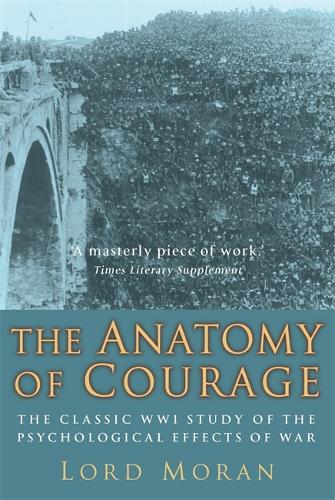
The Anatomy of Courage: The Classic WWI Study of the Psychological Effects of War
(Paperback)
Publishing Details
The Anatomy of Courage: The Classic WWI Study of the Psychological Effects of War
By (Author) Lord John Moran
Little, Brown Book Group
Robinson Publishing
22nd February 2007
United Kingdom
Classifications
General
Non Fiction
First World War
Occupational and industrial psychology
355.02019
Physical Properties
Paperback
240
Width 127mm, Height 203mm, Spine 14mm
266g
Description
'A remarkably human book . . . arresting, and sometimes even unforgettable'
Desmond McCarthy, Sunday Times'A fascinating book . . . It is not easy to do justice to Lord Moran's discursive brilliancy . . . a masterly piece of work' Times Literary Supplement'I set out to find how courage is born and how it is sustained in a modern army of a free people. The soldier is alone in his war with terror and we have to recognise the first signs of his defeat, that we may come in time to his rescue' LORD MORANDuring the First World War, Lord Moran served as a medical officer in the Royal Fusiliers for two-and-a-half years. He won the Military Cross and the Italian Silver Medal for Valour. During these years in the trenches he watched closely the soldiers' conduct under stress. The Anatomy of Courage is his sensitive and scientific study of fear and anxiety. First published in 1945 this early, ground-breaking account of the psychological effects of war, recounted by means of vivid first-hand observation and anecdote, came at a time when shell-shock was equated with lack of moral fibre. In 1940, Moran became Churchill's doctor and his position as a one of history's most important war physicians was secured. His humane, considered observations, scientific analysis and proposed solutions constitute one of the great First World War sources. However, they are perhaps just as relevant to our own conflict-ridden times.Reviews
As relevant today as it was when first written over sixty years ago - The Bulletin of the Military Historical Society
Author Bio
Lord Moran of Manton was Sir Winston Churchill's doctor for twenty-five years until his death in 1965 at the age of ninety. He held the presidency of the Royal College of Physicians for nine years, longer than anyone in the century during which the organisation held democratic elections. He received his medical training at St Mary's Hospital Medical School in London. During the First World War, he was a medical officer in the Royal Fusiliers for two-and-a-half years. He was awarded the Military Cross and the Italian Silver Medal for Valour. Following the war, in 1920 he was appointed the dean of St Mary's Medical School, a post he held for twenty-five years. He was knighted in 1938 and created a peer in 1943. He is the author of Winston Churchill: The Struggle for Survival, 1940-1965. Lord Moran died in 1977 at the age of 94.
